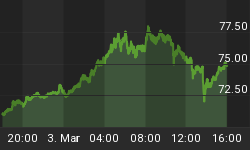"I say, I say, I say - Did you hear about the joke of a central banker...?"
SHOCK and AWE was never supposed to be the Bank of England's approach.
"Predictable", even "stolid" were meant to be this ancient institution's watchwords. The current chief, Mervyn King, proclaimed it so. Time and again.
"Our ambition at the Bank of England is to be boring," declared Dr.King - a collegial buddy of Ben Bernanke's at Massachusetts Institute of Technology (MIT) in the '80s - in a jolly speech of April 2000, just a few years after the Bank's 300th anniversary.
But ever since the Bank gained "operational independence" from government diktat in May 1997, the only boring thing about monetary policy has been King's after-dinner gags on the subject. The actual practice - and the resulting value of assets in Sterling - has been more like riding the Corkscrew at Alton Towers...and just about as sickening.
First the Dot.Com Bubble, then the housing market and finally energy, food, even Gold Bullion prices...everything lurched higher except the purchasing power of the Pound. The TechMARK index rose almost three-fold between Oct. 1999 and mid-March 2000. Then the Bank of England tried to baby-step away from its lowest rates in more than two decades...and the bubble collapsed.
Then the Bank tried to mop up the tech-stock collapse with cheap money, offered at the lowest rates in half-a-century. Consumers and lenders were only too eager to take it, and so average house prices almost tripled from ten years before. But raising rates - once again in little baby-step moves - to try and cool the resulting jump in inflation only popped that bubble in turn. And then, with the value of Sterling losing more than one-quarter against Dollars and Yen, even the Gold Price in Sterling shot higher...up from below £160 to break £550 an ounce this autumn as Dr.King and his team pumped limitless cash into London's interbank markets to bail out those lenders drowning in unpayable debts.
Oh yes, the Old Lady (as the Bank's still known after an 18th century cartoon) was only playing along with the rest of the world, of course. And she did have the City of London to consider as well - let alone British home-buyers and the real estate agents now packing the High Street. But boring she ain't.
And now this old maid - thanks to a shock cut of 1.5% to the base rate on Thursday - is more free with her virtues than at any time since Dec. 1954.
Just whatever happened to boredom?
"We need to cut interest rates not to protect the banks, but to protect the public from the banks..."
So says David Blanchflower, the US member of the Bank's policy-making committee who's voted to raise UK rates only once in 29 meetings since joining in June 2006.
He's voted to cut rates on 14 separate occasion. And during his time on Mervyn King's team, consumer-price inflation - which the Bank of England is mandated to target at 2.0% per year - has more than doubled to 5.2% annually.
But to return to his claim, Blanchflower says the bust-bubble in banking now requires cheap money to prop up consumers. If the rate runs too high - and banks in the UK, as everywhere else, have signally failed to pass on the sharp cuts to rates ordered so far - home-loans will default, families will end up on the street, and people will simply stop spending.
And all because the UK economy can no longer bear interest rates of 5% per year - right around the long-run average of base rates ever since the Old Lady was put in charge of issuing money in 1844.
Now the British government wants private-bank lending to return to the 2007 level - a level which was twice the average of the previous ten years. And to kick-start the fun, the Bank of England has now slashed its base rate to the lowest level below inflation since 1978.
If you think this is a good way to protect innocent households from all those evil, grabbing bankers in the City - and if you think it's a smart answer to the historic tower of debt now teetering above the UK economy - then you're almost as funny as Mervyn King's boredom.
















